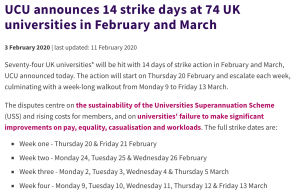Today, thousands of academic and professional support staff from 74 universities will begin a rolling 14-day strike action over a four-week period. This will be the largest industrial action ever taken by higher education workers in British history, surpassing the scale of previous disputes in November – December 2019 and in 2018. A considerable amount of ink has been spilled on the technicalities of the strike (Mike Otsuka, in particular, has written extensively on the pension dispute). My focus in this post is different: I want to establish some of the moral aspects of the strike through the principles governing the resort to war – jus ad bellum.
Let me first address a concern to this approach, namely the applicability of the just war framework with regards to something like strike action. The two issues, war and strike, do not share any commonalities. How could moral principles used to govern war be deployed to understand strike action? I think that the content of individual ad bellum principles can be useful in revealing morally relevant facts in a number of contexts other than war. For example, the principle of proportionality, which demands the benefits of an action must outweigh its potential harm is relevant in almost all situations. The principle of last resort, which demands other less harmful options to be tried first, is also relevant to the undertaking of strike action, given the enormous financial and educational costs. Taken together, the framework of jus ad bellum gives us a substantive moral picture of the action.
My aim here, to reiterate, is simply to show a substantive moral picture of the strike through the lens of jus ad bellum. I make no claims regarding the overall moral permissibility of the strike. All just war criteria are individually necessary and jointly sufficient in order for a war to be justly fought. I don’t know how many criteria would need to be met to justify a strike like this one (or should more criteria be introduced). This is an interesting query, though not one I’ll pursue here. (more…)





